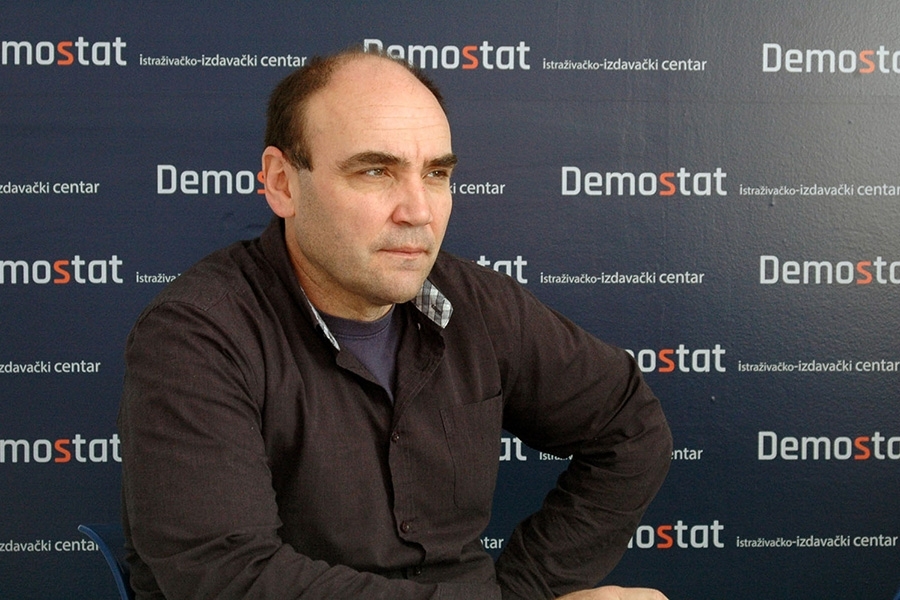Demostat’s Program Manager Zoran Panovic said that there is a lack of debate between the power and the opposition in Serbia, and that an internal dialogue needs to be established on television channels with national coverage.

Demostat’s Program Manager Zoran Panovic said that there is a lack of debate between the power and the opposition in Serbia, and that an internal dialogue needs to be established on television channels with national coverage.

"Serbia has returned to the systemic and anti-systemic position of the political actors. The government, which has the greatest responsibility, treats the opposition as an internal enemy with its arrogant behavior. This is scandalous, it mustnt be done. On the other hand, the opposition, whose responsibility is incomparably smaller, reacts to such a style of government with nihilism and cynicism, instead of preparing itself in organizational terms, trying to parry the authorities with strong political organization and ideological and project profiling," Panovic said.
Panovic pointed up as important that Serbia has a developed political system, which cant be without the existence of serious political parties, and that it also has a public political culture and debate.
"There is no such thing in Serbia anymore. This is a disaster. That spirit released from the bottle can not be easily lured back. There is no dialogue and no debate, only cynicism, insult and disqualification of the political opponents. The inner dialogue about Kosovo would make sense only if turned to a discussion on the state of affairs in Serbia, ran on televisions with national coverage, with participation of representatives of both the authorities and the opposition. President Vucic would have to take part in this televised dialogue. Not in order to do anyone any kind of favor, but because that is a matter of democracy," Panovic said.
On the occasion of the elections for the Belgrade Assembly, Panovic assessed that these elections were "very important".
"Belgrade will be the trigger, essentially it will be another attempt by the opposition to do something against Aleksandar Vucic, and so these elections will have much greater symbolic importance since the opposition thinks victory in Belgrade is the beginning of the end of Vucic. It is very important for the ruling coalition to keep Belgrade, that the Belgrade Waterfont is not controlled by opposition, to show that they are building a capital with their own visual seal," Panovic said.
If we take a look at the history, he added, the changes were once already coming from Belgrade, so the upcoming Belgrade elections will be a big battle.
"We will see how much experience the opposition has gained from the presidential election. They didnt listen to the benevolent criticism by journalists and public opinion researchers. Demostats research showed the approval rating of political parties and politicians, reflecting the state of political and cultural mentality in Serbia. The research showed the presence of a great degree of authoritarianism, which means that the people have a need to have a leader and everything went in support of Vucic, adding to his cunning and brutal propaganda. It was a campaign of a fiery oppositionist who had all the resources of the state in his hands," Panovic said.
Demostats Program Manager said that the opposition got into the previous presidential elections "as a goose in the fog", adding that it reacted to the public opinion polls offensively and arrogantly as an act of collaboration with Vucic.
"Our benevolent advice not to take part in the elections until clear media conditions are met, as well as not to operate in two or three lines with more than one candidate, and also not to leave the instrument of boycott to easily. All this was rejected with disgust. The opposition made a number of cardinal mistakes and we can hope they will make some conclusions, as it would be good for Serbia to have an established opposition and that the government has a strong corrective," Panovic said.
On the issue of regional cooperation and media speculations about the "new Yugoslavia" that Angela Merkel is trying to create, Panovic reminded that in Croatia at least nobody will want any kind of Yugoslavia.
"There can be cooperation only in case there is an arbitrary, control and pressure center. And, that can only be Berlin or Brussels. It is absurd that as soon as the Triestes Berlin Process session was over a commercial war broke out. Croatia could not have loosened without suggestions from outside centers. We need a benevolent arbitrator. I am glad that Serbia and Croatia have good relations with Germany, that being of great importance for us, as we can not do it ourselves alone. Had we been able to go alone, we would not end up in a bloody war hell," Panovic said.
He stressed that it would be good for both Serbia and Croatia, the most important countries in the region, to find a mechanism for the pacification of the conflict, preventively and without constant help.
"The gathering in Sarajevo, on the occasion of the customs war, was very good and it is important that the Minister of Trade Rasim Ljajic said that there was no place for euphoria about Serbia winning the customs war, but that the issues should be dealt with constructively, striving to move in small steps forward. Lets hope that Vucic and Kolinda Grabar Kitarovi? will be able to develop better, cleaner and healthier relations, maybe right in Sarajevo, than those of Boris Tadic and Ivo Josipovic, who had a good intent, but their relationships were disproportionately better than the factual relations between Serbia and Croatia," Panovic said.
Panovic also criticized the way Serbian foreign policy was presented publically, saying that "contradictory and confusing information was being sent to people puzzling them". This moment we have a talk about MiGs and NATO destabilization, and the next - the Brussels chapters that follow and cordial receptions at the White House.
"When a common man follows the media, he cant be sure what is going on actually. One media broadcasts that the West, or NATO, acts againt the Vucics government, right before showing a video of the NATO generals visiting Serbian monasteries and chatting with the state officials. A common man is watching and has no idea where we are heading. In political sociology, this is referred to as the absence of general orientation," explained Panovic.
He stressed that without Tomislav Nikolic, it is increasingly difficult to stick to the "non-aligned policy" and that if "Serbia was heading to the European Union, then it really had to move towards it and not develop a xenophobic anti-Western hysteria in the country. It is psychologically puzzling and frustrating, creating confusion. I do not know if Serbia will ever enter the EU, but if those values and standards in the judiciary, human rights and economy are important to us, then we have to have an atmosphere that matches that. There is a sense of confusion and debacle in the public and all this is very bad for Serbia, " Panovic said. It is as if we are forgetting that the interests of Serbian nationalism rarely correspond to the interests of the Serbian people. We could have been convinced of this more than one time in the near past.
On the occasion of Ikea opening a sale department store, Panovic said that "Ikea is actually the path of continuity".
"They attack DOS, but at the time Mercator center was opened in New Belgrade, Goran Svilanovic was present as Minister of Foreign Affairs and Dimitri Rupel as the Slovenian counterpart. Vucic in Ikea, thats the continuity. With Ikea, we are trying to make up for the development we lost in the 1990s mad politics, which is in some way being rehabilitated. That is fatally dangerous," said Panovic.
In all societies there are issues that are rather being skipped. Certain...
The neoliberal path, started in 2001, has led to especially bad results in Serbi...
For centuries, the region was subsumed within the Ottoman and Hungarian Empires,...
"Serbia has returned to the systemic and anti-systemic position of the political...
In reality, Serbia is closer than ever to NATO. In the course of the last five y...